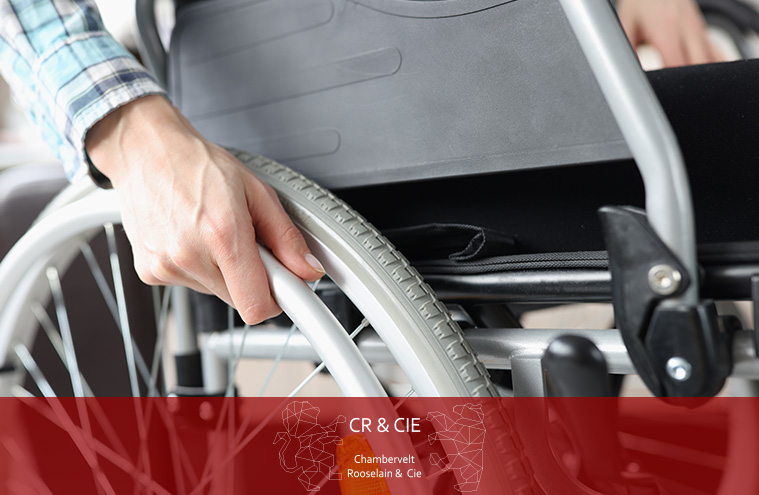

Have you ever thought about a possible occupational disability? No longer being able to practice your profession sounds unlikely - but it's an underestimated risk: According to the German Insurance Association (GDV), one in four people in Germany can no longer practice their profession before retirement due to physical or mental ailments. If an occupational disability occurs, the state benefits are not enough to secure your standard of living and avoid financial problems. In this article, I explain how occupational disability insurance protects you and whether you need it.
Your occupational disability insurance (also known as BU, BUV or BU insurance) pays you a monthly pension if you can no longer pursue your current profession for health reasons. In this context, occupational disability is defined as being unable to work in your last profession for at least six months. Lifelong occupational disability is not required in order to receive insurance benefits.
For the insurance to pay benefits, the occupational disability must not only last at least six months. It must also meet the so-called 50 percent rule. This means that the insurance company only pays the agreed occupational disability pension if you have lost at least 50 percent of your ability to work and can no longer perform at least half of your previous occupational activities.
Mental health problems, a slipped disc or a cancer diagnosis - there are many illnesses that prevent you from doing your job. If you have to forego all or part of your income due to this stroke of fate, things can get dicey financially.
If you have taken out occupational disability insurance, you need not worry about your financial future: Your occupational disability insurance will pay out regardless of the reason for your incapacity. You will receive your cash pension for as long as your occupational disability lasts. If you are permanently unable to work in your profession, you will receive benefits up to a contractually agreed age limit.
Occupational disability can affect anyone. This becomes particularly clear when you consider that illnesses are usually the reason for occupational disability. Accidents, on the other hand, trigger occupational disability far less frequently. The most common reasons for receiving an occupational disability pension are these:
Occupational disability insurance makes sense for you if you are financially dependent on your income. This is the case for the vast majority of working people - a private occupational disability insurance is therefore one of the most sensible insurances. I recommend it to all my clients.
No matter if you are self-employed, employed, an apprentice, a beginner or very experienced in your job - if you don't have a substantial fortune to fall back on, an occupational disability insurance is a sensible investment for you. This becomes clear when you consider the following:
If you start your career at the age of 25 and earn a gross income of 3,000 euros, you will earn 1,512,000 euros by the time you retire. Your labor is therefore your most valuable asset. If it fails due to an illness or accident, only very few people have the financial reserves to compensate for this loss. In comparison: Your car is worth 60,000 euros - your comprehensive insurance covers all damages. This means that your car is often better protected than your labor, which is many times more valuable.
If you are a civil servant, you are entitled to a pension in the event of occupational disability. Only if your entitlement to a pension is less than your cost of living, you should think about a disability insurance (a BU for civil servants). If you are a civil servant on probation or revocation, a disability insurance also makes sense. After all, you are not yet entitled to a pension.
It is not possible to say in general what your occupational disability insurance will cost. After all, the premiums depend on several factors. The following points influence the amount of the premium:
Your age when you take out the insurance policy
If you take out occupational disability insurance at an early stage (for example, in your 20s during your studies), you will benefit from lower premiums. The amount of the occupational disability pension you agree upon depends on your current costs. The pension should be sufficient to provide you with an adequate standard of living if you lose your income from work.
Are you thinking about saving the monthly costs for an occupational disability insurance? You are not alone with this thought. However, there are hardly any real alternatives to occupational disability insurance. The following options come into question:
The statutory pension for reduced earning capacity as an alternative to occupational disability insurance
Provided you have paid into the statutory pension insurance for at least 36 months in the last five years, you will receive a state pension in the event of occupational disability. However, please keep in mind: In 2021, this statutory pension for reduced earning capacity averaged only 877 euros per month. For the vast majority of people, this amount is not enough to cover their running costs.
It is also important to know that you will only receive a reduced earning capacity pension if you are unable to work at least three hours a day in any profession. If you currently work as a department manager, for example, you will not be eligible for a reduced earning capacity pension if your health problems mean that you could work in another job with lower pay. The statutory pension for reduced earning capacity is therefore only an alternative to occupational disability in a few cases.
You've already toyed with the idea of saving the premium for an occupational disability insurance policy and putting it aside yourself in the event of an occupational disability. The idea seems tempting, but it only works if you become disabled towards the end of your working life. If you can no longer work at a younger age, your savings will not be enough to compensate for the loss of your income.
Also, keep in mind that the financial damage caused by the loss of your earned income is immense. Even if you can cover your living expenses from savings, there is often not enough money left over to build up reserves for bad times or old age.
Here is an example:
If you become incapacitated at the age of 53, you still have 14 years until retirement. To bridge the time and have 2,000 euros available each month, you need 336,000 euros in savings. At the same time, you no longer pay into the pension fund due to your occupational disability. This reduces your future pension payments. You also have to compensate for this loss with savings.
Before you take out an occupational disability insurance policy, remember to compare the offers of different providers. Pay attention to the following important points:
Set the amount of your disability pension so that you can cover all your running costs. The running costs include your expenses for housing, the maintenance of your family, food and insurance. I recommend that you choose an annuity that is equal to 80 percent of your net income.
In the event of occupational disability, it is important to have a reliable insurer who will pay you an occupational disability pension quickly and reliably. You can find help in selecting a suitable provider from your insurance broker or here.
There are two types of insurance that make sense to take out in addition to occupational disability insurance: legal protection insurance and daily sickness benefits.
If your occupational disability lasts longer, your pension must still be sufficient to live on in 20 years or more. I recommend choosing a tariff where the pension amount can be adjusted at a later date. That way, you can ensure that your disability pension will be sufficient if your circumstances change and the cost of living increases over time.
Some occupational disability tariffs provide for the insurer to refuse to pay the pension if you are able to work in a profession other than your current one - this procedure is called "abstract referral". It does not matter whether you actually find such a job. For you as the insured, the abstract referral represents a risk. Make sure that your tariff does not contain such a clause so that you are not left without a job and money in the event of occupational disability.
If your occupational disability lasts longer, your pension must still be sufficient to live on in 20 or more years. I recommend choosing a tariff where the pension amount can be adjusted at a later date. That way, you can be sure that your disability pension will be sufficient if your circumstances change and the cost of living increases over time.




ask the experts
Get to know us